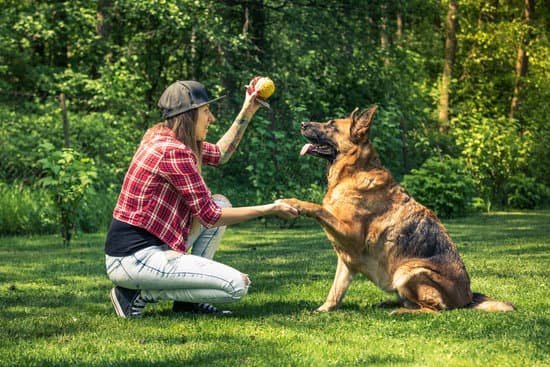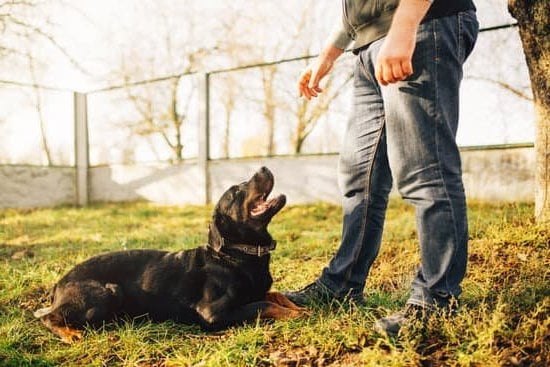Training dogs is an essential aspect of pet ownership, providing mental stimulation, discipline, and strengthening the bond between furry companions and their owners. While many may believe that training is only effective when started at a young age, the reality is that dogs of all ages can benefit from learning new behaviors and tricks. One common question that often arises is: what is the oldest age a dog can be trained?
As dogs age, their learning capacity may change, but senior dogs are still capable of picking up new skills with the right approach and patience. It’s important to understand that older dogs may require different training techniques tailored to their individual needs and capabilities. By debunking common misconceptions about training older dogs, we can empower pet parents to continue engaging with their canine friends regardless of age.
In this article, we will delve into the intricacies of training senior dogs, addressing factors to consider when embarking on this journey. From understanding their learning capacity to implementing effective tips for successful training sessions, we aim to provide valuable insights for those looking to enhance their dog’s quality of life through ongoing education.
Stay tuned as we explore real-life case studies showcasing how senior dogs have thrived in learning new behaviors and tricks, highlighting the importance of patience and consistency in achieving desired outcomes.
Understanding the Learning Capacity of Senior Dogs
As dogs age, their learning capacity may change, but it does not mean that they cannot be trained. Just like humans, senior dogs can continue to learn new things and behaviors throughout their lives. Understanding the learning capacity of senior dogs is crucial in effectively training them regardless of their age.
When it comes to training senior dogs, it is essential to consider factors such as their physical health, cognitive abilities, and previous training experiences. While older dogs may take longer to pick up new commands or behaviors compared to younger counterparts, with patience and consistency, they can still learn and adapt.
To help you better understand how to approach training an older dog, here are some key considerations:
- Tailor the training methods: Older dogs may have physical limitations or sensory impairments that require adjustments in training techniques.
- Be patient and positive: Senior dogs may need more time to process information, so always provide clear instructions and lots of encouragement.
- Keep sessions short and frequent: Older dogs may tire more easily, so break up training into shorter sessions spread throughout the day.
By taking these factors into account and adjusting your approach accordingly, you can effectively train senior dogs regardless of age. Remember, it is never too late to teach an old dog new tricks.
Addressing Common Misconceptions About Training Older Dogs
Training older dogs is often surrounded by misconceptions that can deter pet owners from investing time and effort into teaching their senior canine companions new behaviors. However, it is crucial to understand that age should not be a barrier when it comes to training dogs. In fact, with the right approach and understanding of the learning capacity of senior dogs, training can be successful regardless of age.
To address common misconceptions about training older dogs, here are some key points to consider:
- Older dogs cannot learn new tricks: Contrary to popular belief, senior dogs are capable of learning new behaviors and commands. While they may take longer to grasp compared to younger puppies, patience and consistency are key in helping them succeed.
- Older dogs are set in their ways: While older dogs may have established habits, it does not mean they cannot adapt to new routines. With proper training techniques, even long-standing behaviors can be modified or improved upon.
- Older dogs lack the ability to focus: Senior dogs may have physical limitations and health issues that affect their attention span, but this does not mean they are incapable of learning. By adjusting training sessions to accommodate their needs and capabilities, older dogs can still engage and participate effectively.
It is essential for pet owners to debunk these myths and understand that older dogs are just as capable of learning as their younger counterparts. With the right guidance and a positive mindset, training an older dog can be a rewarding experience for both the pet and the owner.
Ultimately, age should not be a determining factor in whether a dog can be trained or not. What truly matters is the dedication, patience, and understanding that owners put into the training process. By focusing on the individual needs and abilities of each senior dog, it is possible to achieve successful results regardless of how old they may be.
Factors to Consider When Training an Older Dog
When it comes to training older dogs, there are several factors that need to be taken into account to ensure a successful learning experience. One crucial aspect to consider is the dog’s overall health and physical condition.
Senior dogs may have limitations due to arthritis, hearing or vision impairment, or other age-related conditions that can affect their ability to learn new commands. It’s important to tailor the training sessions accordingly and make adjustments as needed to accommodate these challenges.
Another key factor to consider when training an older dog is their history and past experiences. Dogs, like humans, can develop certain habits or behaviors over time that might hinder the training process. Understanding your dog’s background and any potential triggers for certain behaviors can help you approach the training in a more effective way. This requires patience and observation to identify what motivates your senior dog and what methods work best for them.
Additionally, the mental stimulation of older dogs plays a significant role in their ability to learn new commands and tricks. Keeping their minds engaged through interactive play, puzzles, or other stimulating activities can enhance their learning capacity. As they age, it’s essential to keep training sessions short and enjoyable to prevent frustration and maintain their interest. Remember, every dog is unique, so it’s crucial to adapt your approach based on your dog’s individual needs.
| Factors | Considerations |
|---|---|
| Physical Health | Arthritis, sensory impairments |
| History and Habits | Past experiences influencing behavior |
| Mental Stimulation | Interactive activities for engagement |
Remember, age should not be a barrier when it comes to training older dogs. While it may take more time and effort compared to puppies, senior dogs are still capable of learning new things with the right approach and dedication from their owners.
With proper care, patience, consistency, and understanding of your dog’s individual needs, you can successfully train an older dog at any age. In fact – surprisingly enough – some older dogs have been known not only learn but also excel in obedience training even at advanced ages.
Tips for Successfully Training an Older Dog
Senior dogs may require a different approach when it comes to training, but that doesn’t mean it’s impossible. In fact, older dogs can still learn new tricks and behaviors well into their golden years. So, what is the oldest age a dog can be trained? The truth is, there is no specific age limit for training a dog. As long as the dog is physically and mentally capable, they can continue to learn throughout their lifetime.
When training an older dog, it’s important to understand their learning capacity. Senior dogs may not pick up commands as quickly as younger dogs, but with patience and consistency, they can still make progress. One key factor to consider when training an older dog is their health condition. Make sure to take any physical limitations or medical issues into account when designing a training program for your senior canine companion.
To successfully train an older dog, it’s essential to use positive reinforcement techniques. Reward-based training methods such as treats, praise, or toys can motivate senior dogs to learn and retain new behaviors. Keeping training sessions short and fun is also crucial for keeping your senior dog engaged and interested in the learning process. Remember, every dog is different, so be flexible and adapt your training methods to suit your furry friend’s needs.
Case Studies of Senior Dogs Learning New Tricks or Behaviors
Many dog owners believe that once a dog reaches a certain age, it is no longer possible to train them. However, this is simply not the case. Dogs of all ages have the capacity to learn new tricks and behaviors, including senior dogs. In fact, training older dogs can be a rewarding experience for both the pet and owner.
One inspiring case study involves a 10-year-old rescue dog named Max who was adopted by a family looking to help him overcome his fear of loud noises. Through positive reinforcement training techniques and lots of patience, Max was able to gradually become more comfortable in noisy environments. With consistent training sessions and dedication from his owners, Max was able to conquer his fear at an older age.
Another example is Luna, an 8-year-old Labrador Retriever who had never been taught basic obedience commands due to being a stray for most of her life. Despite her age and past experiences, Luna’s new family took on the challenge of training her from scratch.
Through consistent training sessions and using treats as rewards, Luna quickly picked up on commands like sit, stay, and come. This case highlights that with the right approach and commitment, even older dogs can learn new behaviors.
These case studies illustrate that it is never too late to start training a dog, regardless of their age. The key is to approach training with patience, understanding that older dogs may take longer to pick up new skills compared to younger pups. By creating a positive learning environment and using gentle methods, senior dogs can also benefit from mental stimulation and develop better behavior through training.
Importance of Patience and Consistency in Training Older Dogs
Understanding the Time and Effort Required
Training an older dog requires a significant amount of patience and consistency from the owner. Unlike younger dogs who may pick up commands quickly, senior dogs may take longer to grasp new behaviors or tricks. It is crucial to understand that training an older dog is a process that demands time and effort, but with persistence and dedication, remarkable progress can be achieved.
Consistency Is Key
Consistency in training older dogs is essential for their learning process. Consistent reinforcement of desired behaviors through positive reinforcement techniques such as treats or praise will help older dogs understand what is expected of them. Inconsistency in training can lead to confusion for senior dogs, hindering their ability to learn effectively. By being consistent in training methods and expectations, owners can help their older dogs succeed in their training endeavors.
The Role of Patience in Training Older Dogs
Patience plays a pivotal role in the training of older dogs. As seniors may have developed certain habits over the years, breaking these patterns or introducing new commands can take time. It is important for owners to remain patient throughout the training process, understanding that progress may be gradual. With patience, seniors can learn new behaviors and tricks at their own pace, leading to a rewarding experience for both the owner and the dog.
What Is the Oldest Age a Dog Can Be Trained?
Factors Affecting Training Age
Training an older dog is indeed possible, but the age at which a dog can be effectively trained may vary depending on several factors. One crucial factor to consider is the overall health and physical condition of the senior dog. Dogs with physical limitations or those experiencing cognitive decline may find it more challenging to learn new commands or behaviors.
Another factor to consider is the dog’s prior training history. Dogs that have received some form of training throughout their lives may find it easier to pick up new skills even in their senior years.
Benefits of Training Older Dogs
While it may be commonly believed that you can’t teach an old dog new tricks, the truth is quite the opposite. Training an older dog can help strengthen the bond between the owner and pet, provide mental stimulation for the aging canine, and even improve their overall quality of life. By keeping senior dogs mentally active through training, owners can help prevent cognitive decline and keep their furry companions sharp and engaged well into their golden years.
Setting Realistic Expectations
When considering training an older dog, it is essential to set realistic expectations. While senior dogs are capable of learning new things, the process may take longer compared to younger counterparts. Patience, consistency, and understanding are key when working with older dogs. It’s important not to get discouraged if progress seems slow; every small achievement is a step in the right direction towards enhancing your senior dog’s well-being and strengthening your bond with them.
Conclusion
In conclusion, training senior dogs is not only possible but also beneficial for their mental stimulation and overall well-being. While it is true that older dogs may take a bit longer to learn new behaviors compared to younger pups, their capacity to learn should not be underestimated. By understanding the learning capacity of senior dogs and addressing common misconceptions about training them, owners can successfully teach new tricks and behaviors to their furry companions.
Factors such as the dog’s health condition, past experiences, and individual personality should be taken into consideration when embarking on training sessions with older dogs. Patience and consistency are key in ensuring the success of the training process. By using positive reinforcement methods and setting realistic goals, owners can make the learning experience enjoyable for both themselves and their senior canine companions.
So, what is the oldest age a dog can be trained? The truth is, there is no definitive answer. Dogs of all ages have the ability to learn new things given the right approach and motivation. Therefore, regardless of how old your dog may be, it’s never too late to start training them.
The benefits of training senior dogs go beyond just teaching them commands; it strengthens the bond between owner and pet, provides mental stimulation, and improves their quality of life. So why wait? Start training your senior dog today and witness the positive impact it can have on both of your lives.
Frequently Asked Questions
At What Age Can Dogs No Longer Be Trained?
Dogs can be trained at any age, but it may become more challenging as they get older. Senior dogs may have physical limitations that affect training, but with patience and proper techniques, training is still possible.
How Late Is Too Late to Train a Dog?
It’s never too late to train a dog, regardless of their age. Older dogs might take longer to learn new behaviors compared to puppies, but they are still capable of being trained successfully with consistency and positive reinforcement.
What Is the Maximum Age to Train a Dog?
There isn’t a specific maximum age limit for training a dog. As long as the dog is in good health and able to physically participate in training activities, they can continue to learn throughout their lives. It’s always beneficial to keep their brains engaged and active through training exercises.

Welcome to the blog! I am a professional dog trainer and have been working with dogs for many years. In this blog, I will be discussing various topics related to dog training, including tips, tricks, and advice. I hope you find this information helpful and informative. Thanks for reading!





